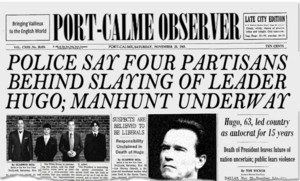Gerard Hugo: Difference between revisions
(Created page with "Gerard Hugo was a Vaillais general and politician who served as the second(?) Prime Minister of Vailleux from 1960 to 1965. During the Second World War, Hugo joined La Comit...") |
No edit summary |
||
| Line 2: | Line 2: | ||
Hugo's government was far more effective, though it dispensed with any semblance of democracy, instead choosing to promote economic development and stability in the country that was struggling to overcome the scars of the war. In a foreboding fashion, Hugo failed to suppress a number of independence movements, leading Vailleux to lose colonies in Mauria, Thalassia, and North and South Arcadia. His military failures here lost him the support of the military, and as economic growth slowed, the public's willingness to overlook the political repression they suffered waned. 12 years after he ascended to power, [[Hugo was assassinated]] by a squad of four pro-democracy partisans from the Comité Liberté, a paramilitary group that had spun itself off from the lifeless Comité. The country was plunged into a civil war, with the conservative, Pakt-backed military on one side and the popular Comité Liberté on the other. As Pakt forces massed on the border, the panicked Comité Liberté reached out to Eisenwald and, in exchange for calling off the invasion and ending support for the conservative faction, promised to effectively cede the long-contested Selgry industrial valley region to the Reich. The Reich squeezed a few more security guarantees, including a few decades of neutrality, out of Vailleux before accepting. Without Pakt help, the conservative faction collapsed and the liberals swept into Port-Calme and set up the current Vaillais Republic. | Hugo's government was far more effective, though it dispensed with any semblance of democracy, instead choosing to promote economic development and stability in the country that was struggling to overcome the scars of the war. In a foreboding fashion, Hugo failed to suppress a number of independence movements, leading Vailleux to lose colonies in Mauria, Thalassia, and North and South Arcadia. His military failures here lost him the support of the military, and as economic growth slowed, the public's willingness to overlook the political repression they suffered waned. 12 years after he ascended to power, [[Hugo was assassinated]] by a squad of four pro-democracy partisans from the Comité Liberté, a paramilitary group that had spun itself off from the lifeless Comité. The country was plunged into a civil war, with the conservative, Pakt-backed military on one side and the popular Comité Liberté on the other. As Pakt forces massed on the border, the panicked Comité Liberté reached out to Eisenwald and, in exchange for calling off the invasion and ending support for the conservative faction, promised to effectively cede the long-contested Selgry industrial valley region to the Reich. The Reich squeezed a few more security guarantees, including a few decades of neutrality, out of Vailleux before accepting. Without Pakt help, the conservative faction collapsed and the liberals swept into Port-Calme and set up the current Vaillais Republic. | ||
[[File:Hugo Newspaper.png|thumb|English-language newspaper from Port-Calme, capital of Vailleux, from 1965, the day after the assassination of longtime dictator Gerard Hugo by a squad of pro-democracy partisans. Hugo's death would plunge the country into a multi-year civil war that ended only when the liberal faction agreed to cede territory to rival Eisenreich.]] | |||
Revision as of 09:25, 18 February 2023
Gerard Hugo was a Vaillais general and politician who served as the second(?) Prime Minister of Vailleux from 1960 to 1965. During the Second World War, Hugo joined La Comité, a group of military officers who began advocating for democracy after coming in close contact with Arcadian officials while serving in the Nouvelle-Etendue. In 1953(?), La Comité staged a coup d'etat that deposed the Vaillais monarchy and instituted a parliamentary system. In 1959, despite low status within La Comité, Hugo seized control of the government, denouncing it as weak, bureaucratic, and inefficient.
Hugo's government was far more effective, though it dispensed with any semblance of democracy, instead choosing to promote economic development and stability in the country that was struggling to overcome the scars of the war. In a foreboding fashion, Hugo failed to suppress a number of independence movements, leading Vailleux to lose colonies in Mauria, Thalassia, and North and South Arcadia. His military failures here lost him the support of the military, and as economic growth slowed, the public's willingness to overlook the political repression they suffered waned. 12 years after he ascended to power, Hugo was assassinated by a squad of four pro-democracy partisans from the Comité Liberté, a paramilitary group that had spun itself off from the lifeless Comité. The country was plunged into a civil war, with the conservative, Pakt-backed military on one side and the popular Comité Liberté on the other. As Pakt forces massed on the border, the panicked Comité Liberté reached out to Eisenwald and, in exchange for calling off the invasion and ending support for the conservative faction, promised to effectively cede the long-contested Selgry industrial valley region to the Reich. The Reich squeezed a few more security guarantees, including a few decades of neutrality, out of Vailleux before accepting. Without Pakt help, the conservative faction collapsed and the liberals swept into Port-Calme and set up the current Vaillais Republic.
